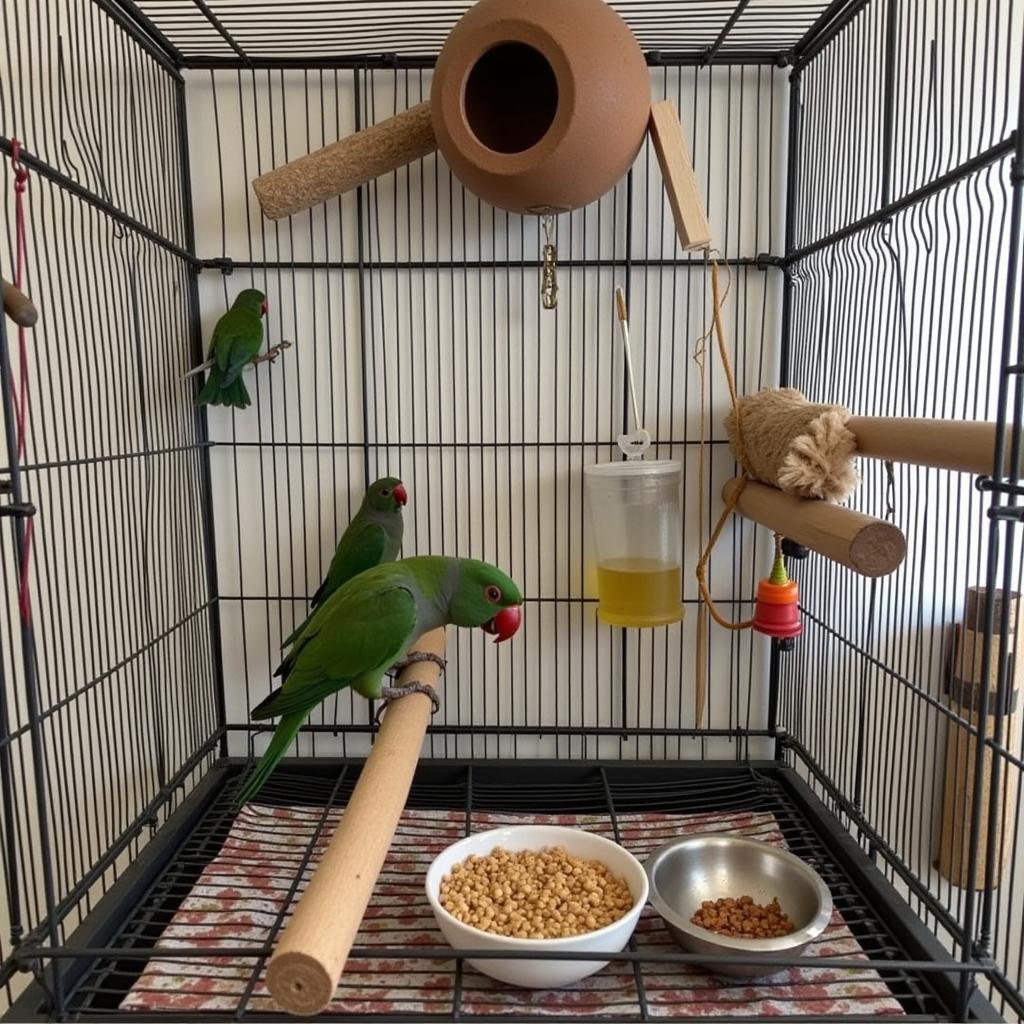The Alluring African Black Masked Lovebird: A Comprehensive Guide
The African Black Masked Lovebird, a small but vibrant parrot, captivates bird enthusiasts with its striking appearance and playful personality. This comprehensive guide delves into the fascinating world of these charming birds, covering everything from their unique characteristics and natural habitat to their care requirements in captivity.
Unveiling the African Black Masked Lovebird’s Unique Traits
The African black masked lovebird ( Agapornis personatus ) is easily recognizable by its distinctive black face mask, hence the name. These birds are relatively small, typically measuring around 5.5 inches in length. Their vibrant plumage showcases a bright green body, a yellow collar around the neck, and a bright red beak. Beyond their physical attributes, these lovebirds are known for their active and social nature, forming strong pair bonds and enjoying playful interactions. See how their striking colors contrast beautifully against their natural environment.
Exploring the Natural Habitat of the Agapornis personatus
African black masked lovebirds are native to Tanzania and parts of Kenya. They thrive in dry savanna woodlands and scrublands where they forage for seeds, fruits, and berries. These birds are highly adaptable and can be found in various habitats, including areas near human settlements. In their natural environment, they live in flocks and communicate with each other through a series of chirps and calls. More information about their breeding habits can be found on the page about african lovebirds breeding.
Caring for an African Black Masked Lovebird: Essential Tips
Providing proper care is crucial for the well-being of an African black masked lovebird in captivity. A spacious cage equipped with perches, toys, and a nesting box is essential. Their diet should consist of high-quality birdseed, supplemented with fresh fruits, vegetables, and occasional treats. Regular cleaning of the cage and fresh water are vital for maintaining hygiene. Learn more about this species by visiting the page dedicated to the african black lovebird.
 Ideal cage setup for an African black masked lovebird
Ideal cage setup for an African black masked lovebird
What do African Black Masked Lovebirds Eat?
A varied diet is key for these vibrant birds. They enjoy a mix of seeds, fruits, vegetables, and specially formulated pellets. Providing a balanced diet helps maintain their vibrant plumage and overall health. You can find captivating photos of these beautiful birds on the african love birds photos page.
Socialization and Interaction: Key to a Happy Lovebird
African black masked lovebirds are highly social creatures and thrive on interaction. Spending quality time with their human companions and providing opportunities for social interaction is essential for their emotional well-being. They enjoy playing with toys, exploring their environment, and engaging in playful activities. Observe how an african black masked lovebird on its nest demonstrates the importance of a safe and comfortable nesting environment.
 Two African black masked lovebirds interacting and playing
Two African black masked lovebirds interacting and playing
Conclusion: Embracing the Charm of the African Black Masked Lovebird
The African black masked lovebird’s captivating beauty, playful personality, and relatively easy care requirements make it a popular choice among bird lovers. By understanding their needs and providing a stimulating environment, you can enjoy the delightful companionship of these charming birds for years to come.
FAQ
- What is the lifespan of an African black masked lovebird? They typically live for 10-15 years.
- Are African black masked lovebirds noisy? They can be vocal, especially in the morning and evening.
- Can African black masked lovebirds talk? While they don’t talk like larger parrots, they can learn to mimic sounds and whistles.
- Do African black masked lovebirds need a companion? They thrive in pairs or small groups.
- How can I tell if my African black masked lovebird is happy? Signs of a happy lovebird include playful behavior, active foraging, and bright, healthy plumage.
- What kind of cage is best for an African black masked lovebird? A spacious cage made of metal bars is ideal.
- How often should I clean my lovebird’s cage? Regular cleaning, including daily spot cleaning and weekly deep cleaning, is essential.
Common Scenarios and Questions
Scenario: Your lovebird is plucking its feathers.
Question: What could be causing this behavior and what should I do?
Scenario: You want to introduce a new lovebird to your existing bird.
Question: What is the best way to introduce them safely and minimize stress?
Scenario: Your lovebird is not eating its food.
Question: What are some possible reasons and how can you encourage it to eat?
Further Reading and Resources
Explore more about African wildlife and culture on our website. You might be interested in articles about African bird species or information on conservation efforts.
Contact Us
For any assistance or further information, please contact us: Phone: +255768904061, Email: kaka.mag@gmail.com or visit us at Mbarali DC Mawindi, Kangaga, Tanzania. Our customer service team is available 24/7.
